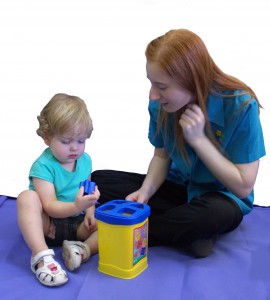
Research indicates that stuttering occurs in around 5% of children under the age of five years. Stuttering is not related to the child’s personality or intelligence and is not caused by the way parents interact with their child. Stuttering can be effectively treated in the preschool years by a speech pathologist.
The World Health Organisation (WHO) defines stuttering as a “disorder in the rhythm of speech, in which the individual knows precisely what he wishes to say, but at the time is unable to say it because of an involuntary, repetitive prolongation or cessation of a sound”. Stuttering is more common in boys than girls, has a genetic link and is thought to be related to the processing of messages in the brain. The exact cause is unknown.
Stuttering most commonly begins between ages two and five years. Some children in this age range go through a period of “normal non-fluency”- stuttering that disappears in time without therapy. It is hard to tell which children will grow out of stuttering and which will continue to have difficulties. Any child who is stuttering for 3 to 6 months or more should have an assessment with a speech pathologist, as therapy is most effective in the preschool years.
Stuttering behaviours
Each child’s pattern is different. Children who stutter will show at least one or more of these behaviours:
Repetitions: These can be of sounds “I want a b-b-b-banana”; syllables “I want a ba-ba-ba-banana”; whole words “I want-want-want a banana”; or phrases “I want a –I want a - I want a banana”. They can be in the beginning, middle and ends of sentences, but beginnings are most common.
Blocking: This is when airflow stops and the child has difficulty getting any sound out.
Prolongations: This is when the child seems to stretch a sound out “I waaaaaaaaaant a banana”.
Interjections: These are the frequent use of words like “um”. “I um, um, um want um, um, um a banana”.
Other behaviours can include tightness in the muscles of the face, movements in the face such as blinking, body movements, reduced eye contact and avoiding certain words or talking in certain situations.
Therapy with a speech pathologist is effective in treating stuttering in young children and is recommended for any child who has stuttered for three to six months or more. Here are some ideas for parents, carers and teachers to encourage smoother speech in young children who stutter and to support their therapy program.
What can you do?
1. Try not to show you are anxious about your child’s speech.
2. Slow down your own speech. Try to model a slow easy rate of speech to your child. Your child may be rushing to keep up with your speaking rate.
3. Give your child plenty of time to talk and let them know you will listen. Pause to give your child a little ‘breathing time’ after they finish a sentence. Let them finish what they want to say.
4. Acknowledge what your child says rather than how they say it.
5. Always look at your child when they are talking.
6. Asking your child to “slow down”, “take your time” or “think about what you want to say first” can be helpful. Try not to nag your child though as they may become tense and struggle more to get words out.
7. Notice situations when your child’s speech is bumpier (more stutters) and times when it is usually smooth. If speech is very bumpy suggest an activity you know will make them more likely to speak smoothly.
8. Try to relieve tensions in the home. Set up family rules for turn taking at meals and other family gatherings. Give everyone a chance to speak without interruption.
9. Set aside a special time each day to be alone with your child, for example, go for a walk or read a story.
How can this help?
• These ideas can reduce the pressure on your child to speak. It allows your child to know that they have your attention.
• By giving your child cues about how to reduce the amount of stuttering, you’re letting them know that you are there to help them, not make them feel embarrassed about their speech.
• By spending quality time listening to your child, you can make them feel more confident about themselves.
If you haven’t already done so, consider a referral to your local Speech Pathologist
Related Blog Posts
If you liked this post you may also like:
Making practice fun
Individualised programs
Importance of routine
Winter Play - Supporting Your Child's Development



